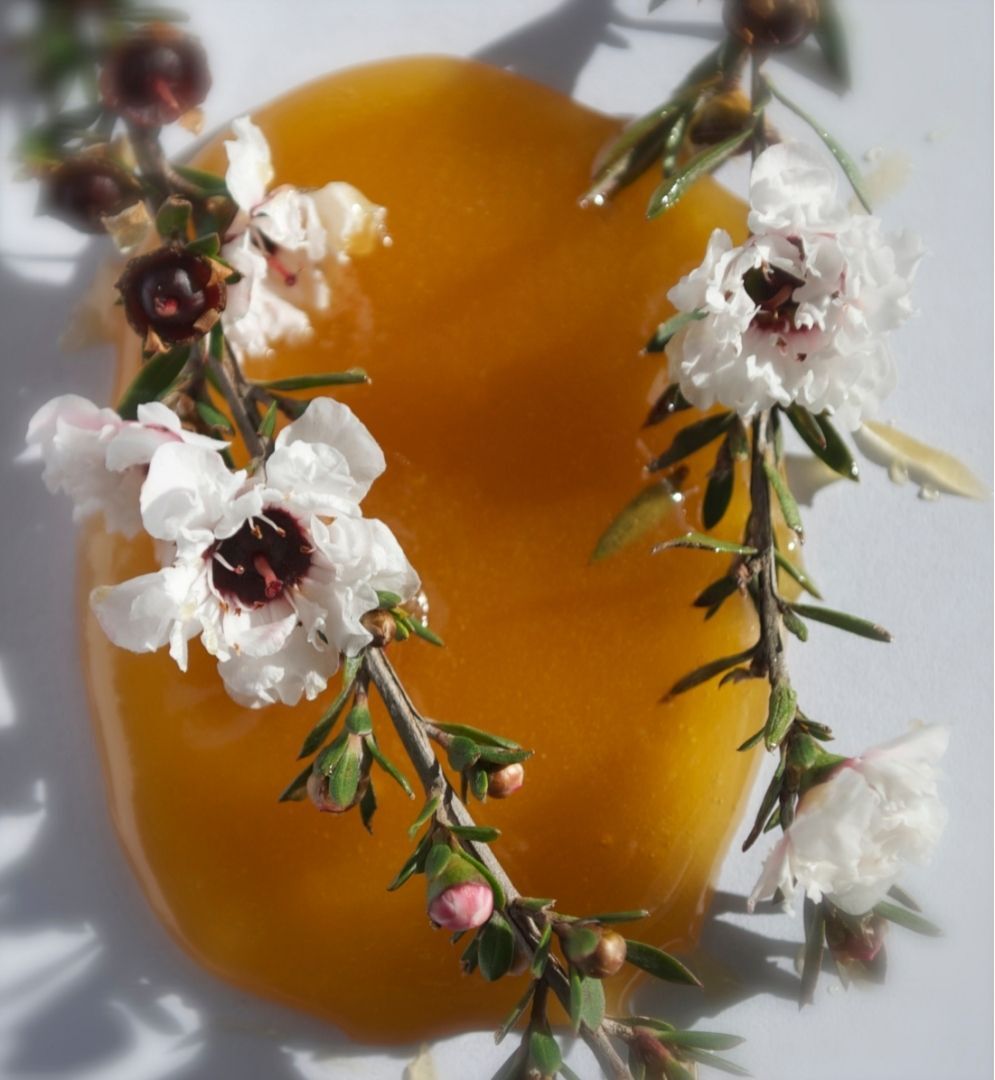

You put it in your tea, maybe drizzle some on toast—but did you know that honey can also be a standout topical skincare ingredient? Used for centuries for its skin-saving and wound-healing properties, it's a top-notch pick in the world of effective, natural ingredients, particularly when you're talking about manuka honey.
A unique type with an even greater amount of benefits than other honey, it's a smart pick not only for certain cosmetic concerns, but for more serious, skin health issues, too. Let's dive into what manuka honey in skin care can do...
What Is Manuka Honey?
Breaking news, not all types of honey are created equal (it's why if you go to the grocery store, you'll find a variety of different colored honeys on the shelf, all with a slightly different flavor). Manuka honey is produced by honey bees that feed on the manuka tree in New Zealand. (They're also found in certain parts of Australia.)
This is important because it's what gives manuka honey its most defining characteristic, namely strong antibacterial properties. Most honey derives its antibacterial nature from hydrogen peroxide, but the manuka variety is unique in that it contains both hydrogen peroxide and another component called methylglyoxal: The nectar of manuka flowers contains a large quantity of a substance called dihydroxyacetone, which is then converted into methylglyoxal.
The higher the concentration of methylglyoxal, the more antibacterial the manuka honey is. There's even a ratings scale known as the Unique Manuka Factor (UMF) which measures the potency of the methylglyoxal and how antibacterial the honey is. Fraudulent manuka honey can be found on the market (Trader Joes was slapped with a class action lawsuit for labeling their honey as 100% pure despite it only testing between 57.3 and 62.6 percent manuka honey), so it's important to check for the UMF labeling, which denotes that the company must have a license and follow the set rules and regulations to guarantee authenticity to the customer.
Given its antimicrobial content, it should come as no surprise that manuka honey is noteworthy for treating wounds, burns, and lesions, both in ancient times and today. There are even manuka honey dressings pre-made for wounds. It should absolutely be used as a medical treatment. But the benefits don't stop there: It's also a great anti-inflammatory ingredient, and anecdotally reported to be beneficial for other issues such as acne and eczema. It also acts as a humectant, and as such is great for moisturization purposes as well.
Benefits of Manuka Honey for Skin
This particular type of honey delivers a variety of benefits for skin, addressing everything from medical to cosmetic issues.
Has strong antibacterial properties: Because manuka honey contains both hydrogen peroxide and methylglyoxal, it's potent against a variety of bacteria. In fact, it's even been shown to have antibacterial effects on e.coli and as well as MRSA, though more research must be done to conclusively confirm which bacteria it can effectively combat.
Promotes wound healing: Manuka honey recruits the correct type of cells, known as fibroblasts, needed to help wounds heal. Aside from that, it also creates a moist environment and a protective barrier to speed up healing.
Fades scars: As it contains trace amounts of hydrogen peroxide, honey is thought to have mild lightening properties, so it could be helpful in lightening hyperpigmentation and acne scars.
Soothes eczema: Raw honey has been shown to help aid a number of skin conditions, such as eczema and dermatitis.
Could help decrease pain: Its healing properties mean manuka honey is often used to treat wounds, burns, and ulcers. There were even a few studies that showed manuka honey decreased pain.
Is an effective anti-inflammatory: The anti-inflammatory properties of manuka honey have not been matched in honey derived from other species of bees. This is beneficial not only for the aforementioned medical issues, but also for other conditions such as acne and eczema.
Offers antioxidant protection: Manuka honey may down-regulate skin-damaging reactive oxygen species (caused by exposure to free radicals), making it beneficial for anti-aging purposes.
Draws moisture to the skin: Manuka honey is a natural humectant due to its sugar component, meaning it helps draw in and retain moisture in the skin. This makes it a useful ingredient in moisturizers and emollients.
Side Effects of Manuka Honey
If you're allergic to bees, you shouldn't be using manuka honey, since there may be a risk of allergic reaction. There's also the risk of a blood sugar increase and therefore diabetic patients should proceed with caution or by physician instruction only. With all honey, infants under the age of one shouldn't be exposed to it, due to the risk of infant botulism. Other than that, the only real drawback, particularly when it comes to the pre-made wound dressings, is some slight stickiness, though this isn't an issue when it comes to most cosmetic products.
How to Use It
Medical purposes aside, utilize manuka honey for its hydrating, soothing, and anti-inflammatory properties. Look for it in a cleanser, cream, or mask, all of which can be used daily.
The Best Products With Manuka Honey
Shop Wild Naturals skin care products, all curated around manuka honey! From face cream to shampoo and conditioner, every product you need is formulated without harsh chemicals, preservatives, or synthetic fragrances. You’ll find only natural ingredients with healing, nourishing, and hydrating properties! What are you waiting for?


